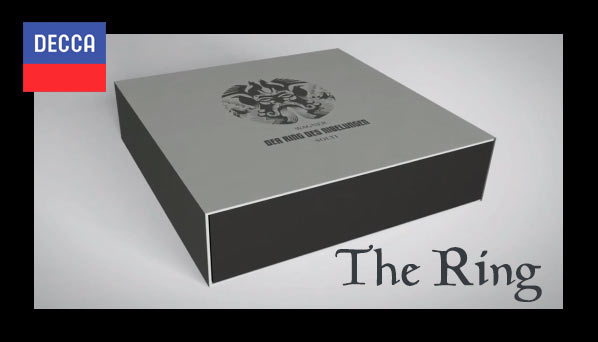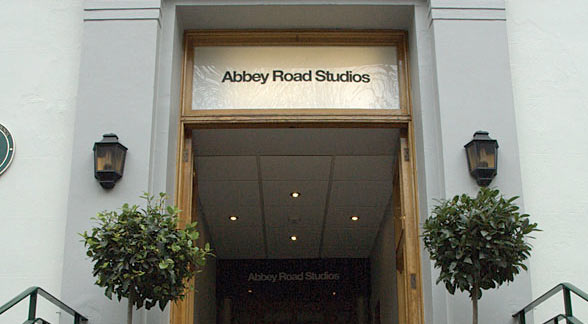Back for the Future of HD-Audio?
I try to keep current with the world of HD-Audio by reading various blogs and audio sites but sometimes I miss things. The other day I received a note from a customer asking about an article he located from 8 months ago on the Stereophile site entitled, “EMI Remasters Its Classical Catalog for SACD”. And just this morning I found myself reading a review of the Decca 17 CD AND Pure Audio Blu-ray boxed set of Sir Georg Solti’s recording of Wagner’s “The Ring”. I’ve already talked about the Universal Music Group’s decision the endorse High Fidelity Pure Audio as a format for the re-mastering and re-release of their catalog. There seems to be a trend here…labels are reaching back into their vaults, applying a little state-of-the-art digital processing and reissuing on Blu-ray or SA-CD or high-resolution digital downloads. What’s up with that?
There was a time that the classical music areas of the major labels spent lavishly on producing new recording of works by dead composers. Never mind those classical releases accounted for only about 4% of the total record market; there was great prestige and marketing value associated with celebrity value conductors and orchestras. During my time as a music student here in Southern California, I purchased boxed sets featuring Sir Georg Solti (I had the entire Beethoven Symphonies) and Igor Stravinsky conducting his own works on CBS Records. These were expensive but cherished additions to my collection and doorways into a world that I was just learning about. Classical music was the highest form of musical expressive in the advertising and in the not-so-subtle subtext of the record labels.
They cranked them out by the hundreds. Not anymore. Sure, DG and UMG and NAXOS release a lot of classical music but things are the same. The market is smaller. The classical genre makes up for just over 1% of record sales now. The demographic that loves listening to classical music is aging and their purchasing power is diminishing. What to do? Invest in lots of new expensive recordings of large ensembles?
No. But you could do what Klaus Heymann, the founder and head of Naxos Records did. After the end of the cold war and the opening of the east block countries, Klaus brought up all of the abandoned and financially strapped orchestras in Eastern Europe and recorded every piece of classical music you could imagine. The Naxos catalog is essentially classical music by the pound. I’m not saying that they don’t have some wonderful productions in their catalog but they haven’t approached the recording of classical music the same way that UMG, Decca and EMI did in the past. This is about quantity over quality. In fact, one of the largest sources of revenue for Naxos comes from licensing their vast catalog to music libraries and university music programs. If you want to hear a recording of a very obscure work by a very obscure composer, there’s a strong possibility that Naxos has one.
The option that UMG, Decca, EMI and others have gravitated towards is to save on the production costs associated with new projects and simply pull out proven marketplace winners from their vaults. They have clever and very skilled audio engineers and producers “revitalize” the older recordings (the so-called “Golden Age” tracks) through the use of noise removal software and de-clicking filters. They re-equalize the timbral balances and may even resort to “sub-harmonic generators” that enhance the low end by producing low frequencies that weren’t ever actually on the source tapes. This is done with great care and taste but it is still an active process.
They also produce lavish slick printed books with well-written histories, full resolution photographs and translated libretti. And they charge hundreds of dollars!
The EMI folks have their work done at Abbey Road studios in London. The recording “home” of the Beatles, Abbey Road is still a very active production facility and has all of the latest CEDAR and Izotope digital equipment for removing noise. They also have all of the classic analog tape machines so that the master edited tapes (usually second generation!) can be transferred to digital. This process is invariably done to a high sample rate and long word length PCM file…never to DSD of any flavor. The reason is that the engineers are planning to do a lot of work in the digital domain and there aren’t any tools that allow them to work in native DSD. The engineers do their thing and then recapture their work product back to DSD in many cases. Why?
Figure 1 – Abbey Road Studio
Because there is a current “buzz” perpetuated by reviewers and audiophile forums that DSD has overcome the shortcomings of digital in PCM format. It’s not true, of course. But the world of making recordings is a far different thing that the world of marketing those recordings. If DSD has a manufactured “buzz” these days that can be of benefit to the people at the labels that are trying to sell the “new” higher quality releases, then that’s what they’ll do.
In the case of Decca and UMG, the model is slightly different. They’ve decided to issue “Pure Audio” releases on Blu-ray format. It’s going to be difficult to convince me that putting an analog recording from 30-50 years ago into an HD-Audio container will create a consumer stampede to new expensive shiny discs…but I’ve been wrong before. If I go there at all, it’ll be for the printed books.
The HD-Audio future seems to be the past in the minds of many!


